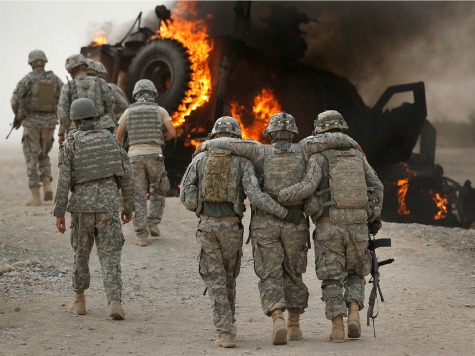
The Reserve Officers Association (ROA), a membership association chartered in 1922 by Congress dedicated to providing a voice for Reserve Component service members of all military branches, released a report on Thursday regarding how sequestration would affect the Department of Defense budget.
The ROA report concluded that cuts made to all services will have deleterious effects on military training, maintenance, research, and modernization, among other issues.
ROA met with House Armed Services Committee Chairman Buck McKeon (R-CA) and House Majority Whip Kevin McCarthy (R-CA) several times to discuss solutions and offsets to sequestration. However, according to ROA, “concerns over budget cuts didn’t take traction on Capitol Hill until the (Budget Control Act) deadlines drew near.”
Secretary of Defense Leon Panetta stated last August, “I’ve made clear, and I’ll continue to do so, that if sequestration is allowed to go into effect, it’ll be a disaster for national defense and it would be a disaster, frankly, for defense communities as well,”
He added, “And frankly, it’s not only true about the DOD budget, it’s also true relating to the domestic discretionary cuts that will deprive communities of the needed federal support they need in areas like education.”
Panetta also said that sequestration was an “indiscriminate formula” that was never supposed to happen but to “trigger such untold damage that it would force people to do the right thing.”
ROA points out that in a letter to Congress on February 20th, Panetta said that force readiness would be compromised, major acquisition programs slowed, and massive civilian furloughs would be triggered. The furloughs, he stated, would “do real harm to our national security.”
The ROA report says that, as a result of the sequestration, minus military personnel funding, “all parts of the DoD budget are cut.”
The total reduction for FY13 (Oct 2012 thru Sep 2013) will be $46 billion for DoD – $40 billion as of 1 March, and another $6 billion near the end of March; Beyond this time period, cuts from sequester will $50 – $55 billion a year through 2021.
Additionally, the report states that most DoD civilians, “800,000 of them, will be furloughed for up to 22 discontinuous work days for the rest of the fiscal year beginning in late April.” Civilians in war zones are exempt from the furlough, as are civilians who are paid “with non-appropriated funds or those who serve a vital safety function,” says ROA.
Also exempted from the cuts, which constitute about one quarter of the DoD budget, are personnel benefit accounts, including pay allowances and subsistence payments. The Wounded Warrior programs for service members and their families will not be cut, states the ROA report.
However, Overseas Contingency Operations (OCC), the budget spent to fight wars with, will be slashed by about nine percent. ROA does note that OCC “will receive full funding because DoD will take these cuts from other portions of the DoD budget to fully fund the war fighting effort – but the corollary is that it means even deeper cuts to other portions of the DoD budget.”
The branches of the military that will be most impacted financially are the Army and Navy. The Army’s budget will be cut by $18 billion for the rest of FY2013.:
The Army will reduce training and maintenance for later deploying units; two-thirds of active brigade combat teams and many reserve teams (other than those in Afghanistan) will be at reduced readiness levels by the end of the year; The Navy and Marine Corps will reduce operations in critical areas such as the Pacific…
The Air Force will cut flying hours and weapons system maintenance leaving many units below acceptable readiness standards by the end of the year… how civilian furloughs are managed may impact the availability of DoD civilian employees who support Reserve units and other elements; TRICARE could be short up to $3 billion in funding which could lead to delays or the denial of service (huge numbers of healthcare workers in the TRICARE system are civilians, about 40%). Research, training and modernization will all be slowed…
Cuts of 9% will be made to 2500 line item investment programs – actions that will lead to delay, confusion, and increased unit costs.
The House Armed Services Committee warned of dire consequences to national security if sequestration goes through. A statement from HASC makes it clear that even if Congress amends the sequestration triggers this year, “some decisions would be irrevocable.”

COMMENTS
Please let us know if you're having issues with commenting.